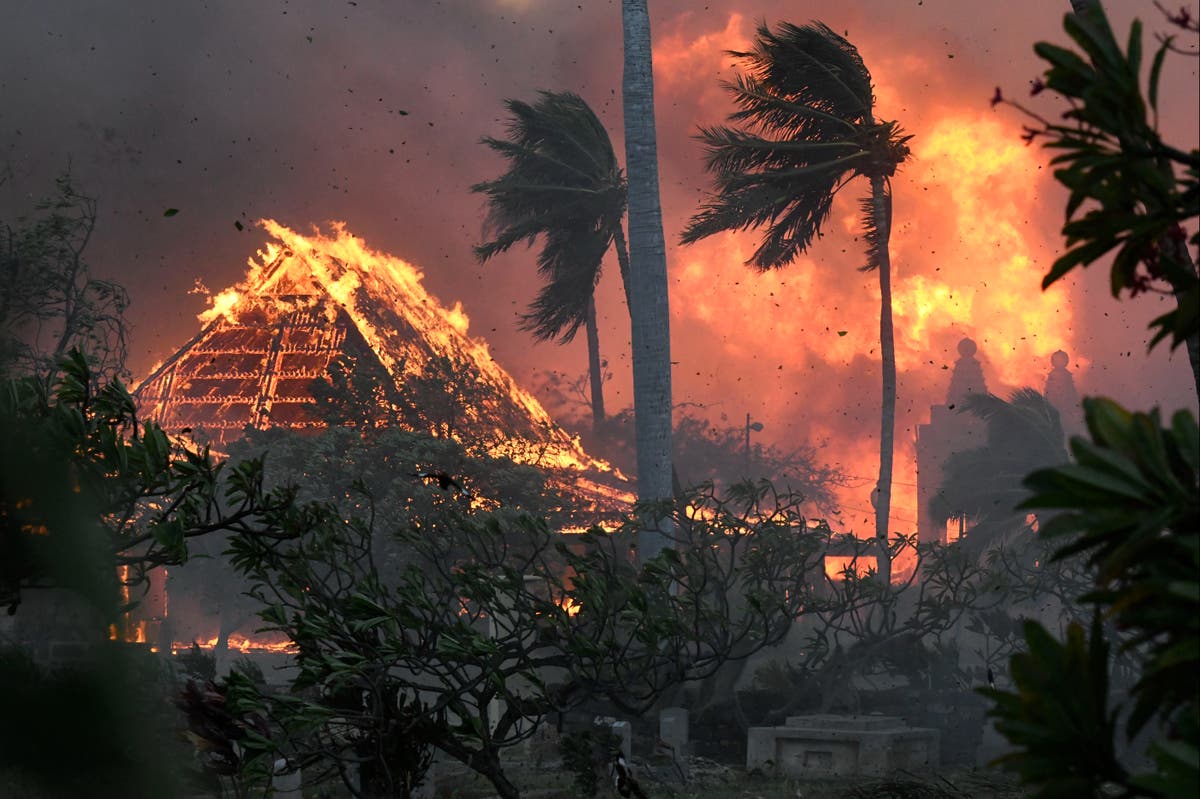This website uses cookies so that we can provide you with the best user experience possible. Cookie information is stored in your browser and performs functions such as recognising you when you return to our website and helping our team to understand which sections of the website you find most interesting and useful.

Devastating wildfires on the island of Maui, Hawaii, have left at least 67 people dead and neighbourhoods in ruins. The fast-moving inferno has destroyed the resort town of Lahaina, which the state’s governor said attracts two million tourists each year – equivalent to 80 per cent of the island’s visitors.
There have so far been three major wildfires on Maui, fuelled by dry conditions and strong winds, and thousands of tourists and locals have been evacuated from the affected areas. It is already Hawaii’s deadliest natural disaster since a tsunami killed 61 people in 1960. There are also fires on some of the state’s other islands, though these are not as severe.
The scenes come after a summer of record-breaking temperatures and fires across the world. Thousands of people were evacuated from Greece, Spain and Portugal as southern Europe battled wildfires, and a series of fires in western Canada sent clouds of smoke over vast portions of the US.
If you’re booked to travel to Hawaii, you might be asking: is it safe to go? Here’s what we know so far, including the latest government travel advice.
Where are the fires?
There have been blazes on the islands of Maui as well as Hawaii, known as the Big Island. The worst conditions are in the west of Maui, in the town Lahaina, but other fires are in Kihei and Kula. Due to the emergency, electricity shortages have been reported, and mobile phone service is unreliable.
Many of those evacuated have been taking shelter in safer parts of Maui or on the neighbouring island of Oahu, reports Reuters, with tourists camping out in Kahului Airport, Maui’s main airport, as they wait for flights to take them home. On X, the platform formerly known as Twitter, the Hawaii Department of Transportation confirmed that Kahului Airport was open but asked people to “please be patient” while “all airlines are sending additional support to aid in getting people off island”.
People waiting for flights crowd into Kahului Airport
(AP)
Big Island’s ongoing fires are centred around the north, including Mauna Kea, North and South Kohala, and Waimea. Some parts of the Kohala Coast were evacuated this week but mandatory instructions to leave the area have been lifted.
Is it safe to travel to Hawaii?
With the fires contained to Maui and the Big Island at this time, other islands in the Hawaiian archipelago are safe to visit. Local officials are encouraging those with trips planned over the next week or so to Maui to cancel or reschedule.
Travel adviser Jim Bendt, who owns Pique Travel Design, told CNN that people should think again before going to Maui at this time to “help ease the burden on local infrastructure”.
Earlier this week, two major US airlines – United and American – said they had cancelled flights to Maui in light of the wildfires; they are still operating outbound flights from the island.
What is the latest government travel advice?
The UK’s Foreign, Commonwealth and Development Office (FCDO) updated its advice for the US on 10 August to reflect the situation in Hawaii, describing it as one that can “change quickly” and saying that the wildfires are “highly dangerous and unpredictable”.
It has not, however, issued a warning against travel to the region.
The latest advice states: “If you are due to travel to an area that might be affected by wildfires, contact your travel operator or accommodation provider before you travel to check that it is not currently impacted. Make sure you have appropriate insurance.”
For those who find themselves in or near areas affected by wildfires, the FCDO advises following the guidance of emergency services on the ground and calling 911 if in immediate danger.
The Hawaii Tourism Authority (HTA) has said: “Non-essential travel to Maui is strongly discouraged at this time. Visitors currently on Maui for non-essential travel reasons are being asked to leave the island as rescue and recovery efforts continue.”
The HTA added: “Currently, travel is still welcomed to the island of Hawaii. Visitors are encouraged to contact their hotel accommodations provider and airlines for updates that could affect their stay on island.”
At a news conference on Wednesday (9 August), Hawaii’s State Department of Transportation director said non-essential travel to Maui was strongly discouraged.
Can I cancel my holiday to Hawaii? Will I get a refund?
There’s no reason not to travel to Hawaii if you’re visiting an island that isn’t affected by the fires; if you cancel in that instance, it’s unlikely you will be entitled to a refund.
Speak to your airline or tour operator to discuss your options, especially if you’re visiting the Big Island or Maui. As mentioned, the state government has advised against non-essential travel to Maui, with flights being cancelled. Given the extraordinary circumstances, holiday companies and airlines may be more flexible with changes to plans.
If you have booked a package holiday to the affected islands, you should be able to claim a full refunds as you are protected by the Package Travel Regulations, which stipulate customers are entitled to their money back if the performance of the holiday is significantly impacted.
Will I be protected by travel insurance?
Policies can vary, so make sure you check to see what your insurance covers. As the FCDO has not issued a travel advisory warning people not to go, cancellation costs won’t be covered by the most providers. However, if your trip is significantly affected, such as the wildfires meaning you’re unable to travel or you need to return home early, then there may be coverage.



 Africana55 Radio
Africana55 Radio 
